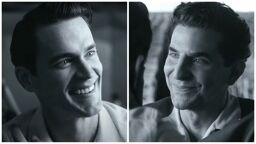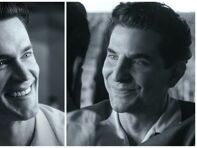
When you hear the word “conductor,” what—or who—do you picture?
“It’s probably an older white man who looks very serious,” jokes Kevin Fitzgerald, the 32-year-old who is currently the Associate Conductor of the acclaimed Jacksonville Symphony in Florida.
It’s no secret that the performing arts are very, very gay—from singers and dancers to mimes and magicians, LGBTQ+ folks simply love to put on a show! And that can be true in the world of classical music, too, except that, historically speaking, the role of the conductor has been largely held by cis, straight men.
How about we take this to the next level?
Subscribe to our newsletter for a refreshing cocktail (or mocktail) of LGBTQ+ entertainment and pop culture, served up with a side of eye-candy.
On one hand, the seriousness Fitzgerald refers to is part of the job; it’s about the music, and not who’s standing on the podium. “It’s kind of anonymous,” he adds. “You don’t really get a sense of who the person is. Because there is this kind of philosophy that, as a conductor, you’re there to express the composer’s intentions. And so who you are, your idiosyncratic personality, is secondary to that.”
But on the other hand, the art of conducting—of leading an orchestra—has favored and upheld a more rigid idea of presentational masculinity for far too long.
However, the openly gay (and married!) Fitzgerald is just one of many exciting, rising names in the field who are helping to gradually changes perceptions of what a conductor can and should be. And what they’re doing is quietly radical. Or, you know, loudly radical—when the music calls for it.
From the small town of Brighton, Michigan, Fitzgerald initially pursued music as an excuse to get out of gym class, but quickly found his passion and dedicated himself to becoming a conductor, carving a path to success on his own terms.
Today, he stands proud at the podium as an expression of LGBTQ+ excellence—championing a more inclusive and modern musical world—and a testament that hard work pays off. Just earlier this year, he entered into the venerable Mahler Competition hosted by the Bamber Symphony, where he was bestowed the “Best Interpretation of a Contemporary Work” honor. Fitzgerald stays winning!
To cap off his incredible year, Queerty sat down with Fitzgerald to discuss the unconventional journey that brought him to where he is today, the positive changes he’s seeing in his field, and the hopeful message he strives to spread through his career. Plus, the conductor gives us his thoughts on conductors at the movies—from the fictional (Lydia Tár of Tár) to the very real and inspirational (Leonard Bernstein in Maestro)—and shares which pop divas he’s listening to in his downtime.
See Fitzgerald’s award-winning work in the prestigious Mahler Competition, and then check out our conversation below:
QUEERTY: I’d love to start by asking a little bit about your life story—no big deal. So, what is it that brought a kid from a blue-collar family in suburban Michigan into the world of professional, classical music?
KEVIN FITZGERALD: I was pretty dorky kid, and I grew up in the country, so I didn’t have a lot of neighbors. I mean, it wasn’t the backwoods, but I kind of grew up in my own little world. And I didn’t really connect to other boys very well. When I got to sixth grade, they’re like, “Okay, you have to take gym,” and I was terrible in gym. I was so un-athletic. So I was like, “How can I get out of this?”
They told me if I took band, I didn’t have to take gym. And I was like, “Sold!” [Laughs.] So I signed up for a band, and about a month in, I realized I really liked it. It was something that I was just naturally a little bit better at than the other kids.
And then there’s just this tribe: the band kids. The place I grew up was super conservative in a lot of ways, so just being a to-be-announced gay kid, [band] was a great safe space. My band friends are the first people I came out to.
And then it just took off from there. I started taking lessons privately, and it became my thing.
I think that feeling’s very familiar to a lot of us. And so that was it—you found your place, your people—and you knew that’s what you wanted to do with your life?
By the time I was 14, I had basically committed myself to becoming a professional musician. I’m a trumpet player, so I was focused mostly on that, but then my trumpet teacher put the bug in my ear that I might have the personality to be a conductor—like, the leadership role and the imagination—so he started suggesting I explore that.
The second half of my high school experience was at Interlochen Arts Academy, which is a boarding school for the arts in upstate Michigan. And that was a gay boy’s dream [Laughs.] There were more gay guys than straight guys. And it was just so encouraging. I got to become so much more comfortable with myself so much faster because of that experience. And when I came to college, I was so ahead of a lot of the guys in my class, because they were just kind of dipping their toes.

Then post-college, as you’re finding your career path, are you out to colleagues and others in that professional realm?
I couldn’t be more out! Like, the Jacksonville Symphony is the most progressive—I mean, I know it’s in Florida–but it’s such an open, inclusive community. Myself and the music director, we are both openly gay, we have Pride concerts, we have a huge following of audiences in the gay community, there are gay musicians in the orchestra… It’s very, very open.
The arts are filled with gay people. As a conductor, it’s an interesting situation because I do think that, culturally, for all the progress that has been they made for gay people on the podium, we have to thank the female conductors—because there’s so many more female conductors now. And I think that what they’ve done is they have broken down this conditioning that authority and leadership has to be “masculine.”
Even if you look at two generations ago—the women conductors that were joining the ranks of orchestras—there were so few of them and a lot were, for lack of a better word, presenting a little more masculine. I think there was pressure to do that, you know? Now, you see someone like one of my heroes, Yannick Nézet-Séguin, who is on TV with his husband, and he’s conducting the Metropolitan Opera with his nails painted and wearing really flamboyant clothes—and shorts!
For a long time, I think I felt I needed to present—well, I was okay with telling someone, “Yes, I’m gay,” but I didn’t want to seem gay. Because all my role models were either straight, or there was just this idea that “if you’re a good artist, then you take this really serious—and if you’re taking it really serious, you shouldn’t be feminine.” I mean, this wasn’t something I was explicitly taught, It was just kind of what I absorbed through watching other people.
But think about the archetype of a conductor, if you close your eyes: It’s probably an older white man who looks very serious. And it’s very “un-sexual” situation—it’s not really about that, it’s about the art. But it’s kind of anonymous. You don’t really get a sense of who the person is. Because there is this kind of philosophy that, as a conductor, you’re there to express the composer’s intentions. And so who you are, your idiosyncratic personality, is secondary to that.
And I think that’s changing. I don’t think it should change totally, because we still need to do what the composer asks of us, but I think what’s making conductors different now, and stand out from from one another, is who they are off the podium—what they do and what they represent. It’s a little bit of identity politics at work, and I think it’s okay as long as the identity that you are espousing is positive.
That’s so fascinating. Especially because the presentation of a conductor, classically, does feel somewhat rigid and exacting in their movements. But then there is something of a florid quality to it and, not to complete simplify or make light of things, I can see how it could be “gay’d up.”
No, exactly! Let’s just put it this way, since we’re talking about this kind of masculine versus feminine vibe: For the longest time, all conductors and orchestral musicians wore a tuxedo, with a tail and a bow tie—essentially, old-fashioned clothes, which is like a uniform that makes you anonymous. But I think that your motions and the way you communicate and how you can interface with the orchestra through your eyes and your facial expression, that can be “queer-ified” in a way. I just don’t know any conductor who’s trying to do that.
I just think that a feminine quality could come out if that’s what the music demands. And this is the point: We’re doing what the music’s doing. So, I’ll be feminine because it’s the music—not because I’m feminine.
Related*


This legendary gay Russian composer is being canceled because of Putin
Several orchestras have pulled his work from planned concerts in the wake of the Russian invasion of Ukraine.
Right, and to your point earlier, I think it’s fair to say you see this industry, this discipline, as one that’s moving in a progressive direction, where the femininity is finally not seen as detriment. People are no longer looking at that as a weakness on the conductor’s behalf, right?
Exactly! And here’s an example: We played E.T., live to film, and there’s one of the pieces called “Into The Closet”—because, you know, E.T. lives in the closet. And I made the joke to the orchestra, like, “Haven’t been there in a while!” [Laughs.] And it was funny. Nobody cared. So I think that that’s an example of showing your personality—and that doesn’t necessarily mean talking about gay issues; It just means you’re not encumbered by the questions of like, “Can I? Should I? Do I have to protect myself?”

That makes me curious: With the orchestra, and in your line of work, it’s not like you’re only playing the “classics,” so to speak—you’re also doing more modern and popular music, film scores and pieces along those lines. But what I want to know is: What are you listening to in your free time?
Well, I love music, obviously. And I don’t listen to classical music for fun very much. So I have my pop divas, which, hands down, my number one favorite artists of all time is Celine Dion. Bar none. I know basically all of her songs—even her French songs—by heart. She taught me so much about how to play classical music, and about drama and timing. She’s a little cheese sometimes, but she doesn’t care. She’s so unabashedly herself. And that’s something that I’m trying to work on.
Adele is a close second. Faouzia—I don’t know if you know her, but I love her, she’s a Moroccan singer. I love Lea Michele from Glee. I also love Motown—coming from Michigan my mom always had Diana Ross and The Supremes playing. And then country! My family always had country playing, so I love Reba, Dolly Parton, Wynonna Judd, The Chicks.
Then this is unrelated, and it may be hard to believe, but I love reggaeton. So, Bad Bunny, Maluma. I don’t even speak Spanish, I just love the rhythm of the language and the beat. The language provides rhythmic patterns that you wouldn’t get anywhere else.
And then Ava Max. Kim Petras. Kylie Minogue. I love those out at the pool, or at the gym. You know, you try to avoid being basic, but sometimes you can’t help it!
And I wanted to ask about you husband, who is also in the orchestral music scene. It sounds like your jobs keep you both very, very busy—do you guys find it hard balancing the work with a social life?
My husband is associate principal Viola of the North Carolina Symphony. His name’s Kurt Tseng. He’s actually also from Michigan—we’re from 20 miles apart, but we met in Alabama at our job there.
And this kind of brings up a point that, when you commit to classical music, it is such a competitive industry—to just make a living is a blessing. So you have to put that first for a really long time. These people talk about balance and it’s like, no—every decision I made from 14 until very recently was completely based on my career. And it wasn’t because I’m so megalomaniac, it’s just because you have to.
So, my husband lives in Raleigh, we have a home with our dogs in Raleigh. I’m in Jacksonville a third of the year. So that’s hard, you know? With the travel alone, we’re like two ships passing in the night.
But, socially, it’s also hard because, when the concerts happen? Weeknights, Friday, Saturday nights, sometimes Sunday afternoon, Thursday night. I don’t want to go kiki after conducting sometimes—I’m exhausted, you know? Sometimes I’m in the mood, and I’m like, “yes!!!” But, what I find is hard is that, because I don’t live here 24/7, I make little traction with a friend group, and then I’m gone for two weeks or three weeks and I can’t come to stuff, and then they kind of fizzle out. You know, I don’t blame them—it’s just the nature of the game.
It’s been a pretty big year or so for buzzy, “awards bait” movies about conductors. Have you seen Tár with Cate Blanchett?
Okay, so I haven’t seen Tár. Because I believe it’s kind of trauma p*rn—using my art form as trauma p*rn. I mean, if someone put it on, I probably wouldn’t turn it off. [Laughs.]
Fair, far. And then there’s Maestro with Bradley Cooper as Leonard Bernstein. Does that one feel a little more exciting to you?
I’m so excited about it; this is totally different from Tár. This is a celebration of—without Bernstein, I would not be doing what I’m doing. Because he was the first American-born conductor to really go international and dominate the industry. He conducted every orchestra—Berlin Philharmonic, Vienna Philharmonic. He was in demand. And he was born here, you know? People might not know, but there’s a very big sense of Euro-centricity in classical music. Being from Europe, being able to speak European languages, is actually considered, for some people, a plus. It’s a European art form that we have adopted.
So Bernstein, for me, is just someone who was able to cut through all that and blaze a trail. And I’m just so happy that they did not straight-wash him—that his relationships with men are there. I haven’t seen the film yet, but even the trailer made such a big deal about it.
It’s just so exciting, and I think it highlights his complexity. It’s not trying to say, “Oh, he was just a great artist.” I think there’s that tendency to venerate conductors of the past, and make them this, like, stoic figure that kind of makes them saintly, you know? And I think it kind of takes their complexity and their humaneness out of it.
And Bernstein, his persona, was that he was a human first. We talked about conducting gestures and expression earlier—he was so over the top with his gestures, and he was so unapologetically himself. And I think, again, that’s something that Celine Dion and Bernstein had in common, and that’s something that draws me to them.
Related*


WATCH: Bradley Cooper & Matt Bomer cozy up in gorgeous new look at Leonard Bernstein biopic ‘Maestro’
Bernstein’s marriage and many gay flings are the crux of this romantic look at the great American conductor’s life.
It all ties together! Which is why it’s so great to talk to you in this moment. I think, as someone outside of this musical world, we’re not always conscious of these gradual yet seismic shifts in your industry. But it is happening. It’s becoming more inclusive in this very important way. And your story is so indicative of that.
Exactly. And even if you’re not making different musical decisions based on your personality, who you are is going to bring people to the concert hall. And I think that’s what I’m interested in.
If you look at history of who becomes a classical musician, you’re either from a family of musicians, or there’s a lot of folks who come from affluent families and becoming a musician is just something that they’re able to do because they can devote all their time to it, they don’t have to work.
I come from a blue-collar background, and it’s been hard—harder for me than a lot of people I know, in certain aspects. But I would love for people to look at me and say like, “If he can do it, anyone can do it!”
And also you don’t have to be “special”—in quotes—to become a leader and a conductor. Like, you can just be a good person who comes from humble background, who worked really hard and was lucky to get opportunities.
If you think about conductors of the past, there’s this mystique around them. And they seem superhuman, and not relatable to anyone. They’re like Superman—these figures of supernatural gifts. And I just don’t see myself that way.
I want to be seen as artistically unique and having something to share musically. But I also want people to see me and think dreams are possible. You don’t have to come from money. You don’t have to come from connections to get where you want to go if you actually are committed and ride through the ups and downs.
The above interview has been edited and condensed for clarity.
Scroll down below for a few more of our favorite shots from Fitzgerald’s Instagram:
















































Kangol2
Another nice interview, this time of a talented classical musician. I love that he really appreciates Motown and reggaeton, country and pop music, etc., in addition to Euro-American classical art music. He and his husband make a cute couple too.
bachy
Class act all the way.
RomanHans
Great interview, sounds like a smart man. He’s absolute right about Tár. I’m sorry I watched it.
Zane Rhoades
Hubby Robert & I met and immediately fell in love with Kevin – and soon thereafter – Kurt, right after they began with our orchestra here in Birmingham. We’re so fortunate to have experienced their talent! Their relationship should be a model to queer couples. We will always cherish their friendship and the beauty of their relationship and now marriage!